#gender: a wider lens
Text

Elliot page has said she wanted to be a ten year old and I immediately thought of the ‘gender: a wider lens’ episode about how many dysphoric teens and young adults transition mainly because they don’t want to grow up.
I think Page probably has had long lasting dysphoria as opposed to ROGD but I think it might still fit her otherwise
#Elliot page#Ellen page#tifs#gender identity#gender critical#radfem safe#gender a wider lens#gender: a wider lens
50 notes
·
View notes
Text
i think some of the popularity that meta horror has garnered is a little bit disingenuous tbqh even though i do like some of the movies that have come out of the subgenre, people don’t realize that the foundation of the slasher genre was established in the 60s/70s and a lot of the 80s movies that have become so classic were already riffing off of the tropes established by those movies before full fledged meta took off. the idea to make friday the 13th was sparked by the commercial success of halloween. the original script for slumber party massacre was a parody of the genre and the movie retains much of that humor which is referential to past slashers by nature. + it intentionally uses typical slasher tropes around gender and sexuality to bring forward the concerns of teenage girls. is that not something that meta horror is frequently touted as doing? child’s play is like a slasher, “except —” which is what a lot of meta horror comedies do now (“slasher except it’s a possessed doll” is not that far off from “slasher except it’s freaky friday” and whatnot). this isn’t to say that scream isn’t foundational to what the slasher genre evolved into or that contemporary meta slashers aren’t doing something interesting but i also think they tend to lean towards cynicism towards the movies they’re deriving their themes from + they’re not even as different as they think they are from “classic” 80s movies that already are borrowing from classic slashers which in turn borrowed from even older horror (for example, in halloween, laurie is watching the thing from another world from the 50s which was adapted into the now classic john carpenter’s the thing in the 80s). and of course many of these older horror movies were adapted from literature which also inspired more literature. like the shelley/byron/polidori scary story writing contest is now legendary but also you don’t get the shining without the haunting of hill house (and you don’t get the haunting of hill house without turn of the screw, for example) and the shining is probably one of the most referenced movies by other media of all time. horror has always been an intertextual genre let’s stop pretending it didn’t become “self aware” until 1996
#+ scream used a framework for examining slasher tropes outlined in men women and chainsaws in 1992#bringing the term ‘final girl’ + the ‘rules’ of slasher movies into pop culture#so not only is it working from the canon of slasher movies that already exists#but it also is looking at this academic text that establishes a credible film + gender studies lens for the slasher genre#omg not to mention what the author has to say about slasher-adjacent movies that are critically acclaimed#— movies that use a slasher framework for the plot that address similar themes#but distance themselves by making the violence + resolution of conflict less direct#(i.e. moving the conflict from the physical to the psychological) for example silence of the lambs is one movie she cites#making similar themes + similar conflicts more palatable to a wider audience#which is like the opposite response of meta slasher to the classic slasher canon#i guess if you want to make a slasher movie that isn’t really a slasher movie you have two options — lean into it or lean away from it lol#anyway all this is to say. idk whatever i’m bored + too depressed to get up and do anything productive rn#anyway. count how many times i say ‘for example’ in this post
26 notes
·
View notes
Text
Seriously tempted to make a highkey detached headcanon/pseudo-analysis post regarding Zant and gender. Probably a bad idea.
#scrawny rambles#zant#strong emphasis on the pseudo it's red string pins and corkboards fueled by audhd & months if not cumulative years of hyperfixation#my thing is that the optics are awful and this is tumblr#when it's like. alot of finding my gender issues and feminine rage in a character that... does not play *well* with that#it could be seen as crossing a line when i'm closeted transmasc and i see them as. well closeted *something else*#if that makes sense#it's deeply meaningful to me and comes from a place of compassion#but i think even someone in good faith can see the obvious issues with that#let alone the numerous people who either don't/no longer have the patience#or are looking for a fight#idk man. don't really have anyone personally to talk about this with that has the same extensive bg on the guy as i#i've got good and eager friends#but i'm giving them the context— the conversation is inherently led and skewed by my biases in a topic i have wayyy too much investment in#and they don't. yknow?#as opposed to presenting it to other people who share it and have wider context#and the sense to know if i'm bullshitting#the lens ends up being an addition instead of the groundwork; y'feel?#it's 1am god help#seasonal depression has my sleep schedule in a shit pit. sad!#tl;dr: things that look bad unfortunately compell me and that's why i give villains 18752489 flavours of queer biracial and neurodiv. ty.#just like me fr frrrrr
24 notes
·
View notes
Text
These "expert" pediatricians were paid by a far-right legal group to come up with evidence to attack the WPATH transgender standards of care
What this is: Leaked documents show the anti-LGBT legal group Alliance Defending Freedom paying manufactured experts to attack WPATH’s transgender standards of care, asking them to find evidence for harmful anti-trans myths that they knew were baseless and unsubstantiated. This is an original finding and report by Zinnia Jones (she/her), a transgender Florida resident of 11 years whose access to HRT is now jeopardized by the enactment of state law and policy based on work from these same experts.
Detailed summary: From 2019 onward, states across the US have been faced with an intensely active wave of reused anti-trans experts, recurring characters who keep repeating the same spurious arguments against gender-affirming care in court cases, legislatures, and other policy bodies. Where did they come from, and why did this start happening?
Due to the Florida-based anti-LGBT hate group American College of Pediatricians choosing to set one of their Google Drive folders to be publicly viewable by anyone, files were released this month showing the contents of their staff’s communications and other working notes over several years.
These documents included records of the Alliance Defending Freedom - another hate group who are also responsible for bringing the mifepristone case with ACP as a plaintiff - approaching ACP's leaders in 2018 and 2019 to offer them a grant of $10,000 or more. The ADF wanted the pediatricians “to draft a white paper that refutes the WPATH Standards of Care”, “for use in litigation and should also benefit many other allies at State and Federal Level”.
ACP’s president Quentin Van Meter and executive director Michelle Cretella promptly got to work on this “Special Project”, and the ADF hosted expert witness workshops at ACP's conferences. ACP members including Van Meter went on to present anti-trans testimony in several ADF-litigated cases and ADF-involved trans youth care bans.
In May 2022, Van Meter authored a sham report for Florida Medicaid to justify their trans coverage exclusion, mostly drawing from previous ACP position statements; court filings later revealed Michelle Cretella was recommended by the Florida governor’s office, and she pointed the way to all the other anti-trans experts hired by Florida in 2022 to support the Medicaid exclusion of transition care.
One notable document found in the ACP’s drive contains “Transgender Research Requests”, with the ADF asking Cretella and other ACP leaders to “substantiate” now-commonplace anti-trans talking points. These included bizarre claims by the ADF such as “it is normal during adolescence for children to go through a phase when they identify (to some degree) with the opposite sex”, and “For those who have undergone hormone therapy and genital change surgery, a paper that says they are no happier (and perhaps worse off if the research supports it)”.
The ADF was asking this anti-trans group to come up with anything that could support the arguments they were already planning to make.
This appears to be one of the very sites where those baseless myths about suicide, social contagion and other supposed harms, now regularly repeated in court cases and testimony and uncritically accepted by the mainstream right wing, were conceived and gestated.
These same experts then substantially reused these work products in their reports for Florida Medicaid, a public health agency whose accepted standards determination process is supposed to be a transparent and open-ended evaluation of peer-reviewed medical evidence.
Altogether, these documents appear to demonstrate a paid smear by a hate group and right-wing law firm against a leading professional transgender healthcare organization following the best available evidence and medical practices, as well as misconduct on the part of ACP experts who reused this work in their reports for a Florida public health agency.
(asks are open)
#transphobia#transgender#trans#Florida#Florida Medicaid#trans youth care ban#trans care ban#Alliance Defending Freedom#American College of Pediatricians#LGBT#tw transphobia#tw homophobia#Ron DeSantis#Florida GOP#SB 254
253 notes
·
View notes
Note
how do you as a bisexual come to terms with the fact that the trans community has literally made homophobia much worse. ppl are proudly being openly homophobic and when you dig deeper it’s actually the “queers” and transgenders who think kids can transition who they have a problem with (not all of course but a good chunk) I believe ppl who wouldn’t otherwise be homophobic are being homophobic bc of the trans community. I use to really struggle w internalized homophobia, and still do, it was only this past year where I came to terms w it and told my sister/close friends. I wish it could be just a normal thing to be gay and you’d be left alone, I believe we were on a trajectory for that. But now things have gotten worse, and thanks to the gender nonsense, openly bigoted ppl (especially religious) are being praised and promoted. All this bc of trans activism. I don’t even care anymore about what they do to themselves, but the damage they’ve done to actual gay ppl is insane and we’re already facing the backlash. I’m not sure if we’ll ever live in a world where being lgb isn’t a big deal.
Honestly? I think the benefit of pushing 40 is that I have a wider lens through which to view activism. And I feel the same way about LGB rights as I do about women’s rights.
Which is to say, every time a big gain is won, there is backlash. There are parts of society that get worse as the culture tries desperately to adjust around the new changes.
Men today are more porn sick and sexually aggressive than 20 years ago. In some ways. People are polling less positively about the LGTBQI+ but how much of that backlash is really directed at the LGB? Are polling groups even bothering to distinguish between LGB and “queer” people?
Let me tell you what life was like as a bisexual teen in 2003. Let’s go back 20 years and I can tell you the world has changed so much for the better. 20 years ago gay rights activists started really making headway towards civil rights guarantees. Suddenly middle Americans had to confront that gay people were among them and not just haunting bars and bathhouses. I don’t think I’ve ever seen such rigid gender norm adherence as I did back then. Men couldn’t wear pastels or purple or pink. Guys got called gay for having a messenger bag. There is an entire episode of “Friends” about it. Sussing out the Gays Among Us became obsessive. Emo culture was a direct response to how frantic straight people were to appear duly heterosexual. TV shows still depicted us as degenerate freaks if they depicted us at all. A few HBO shows that were soft core porn more than anything and Will and Grace was all anybody had. Shows like Xena and Buffy got away with lesbians because men said out loud that hot women kissing was fine. These were the early days of straight men having open lesbian fetishizes. We couldn’t get married. We could get fired for being gay.
For women there was no movement to normalize our natural bodies. I’d spend hours shaving myself smooth. Not wearing makeup was unheard of. Cellulite wasn’t even a word I knew let alone knew was normal. There weren’t a million online resources teaching women that vaginal discharge is normal and I grew up thinking (as did many others) that it was a private shame.
And as far as MeToo stuff? It’s easy to feel defeated in the moment but nobody was using the word ‘consent’ in my day. Men getting women drunk was a joke. Men pushing for sex was a joke. Men calling a woman that had one too many dates or boyfriends a slut was normal. Three of my male friends pinned me down on several occasions and took turns rubbing their dicks on me to completion.
The therapist I told said I “needed to work on my boundaries”. The word rape never even entered my mind. Rape was something a stranger with a knife did. It wasn’t something your best friends did to you and then laughed about. It isn’t something you submitted to because fawn and freeze are real fear responses. No one told me my friend forcing my hand down his pants was abuse because I continued to go over his house, didn’t I? No one told me about red flags or cycles of abuse.
And the older women you told rolled their eyes. What I endured was so mild compared to many other women. Men forcing themselves onto women was just normal.
I can’t tell you what it means to me to see so many young women calling it out. Refusing to stay in a bad situation. Refusing to date entirely sometimes. Women sharing red flags and advice to stay not just safe but thriving.
Don’t get me wrong- the current gender movement is regressive and dangerous. I’m not saying it’ll all work itself out. Activism is constant work but things ARE getting better. They really are, even if sometimes it doesn’t feel like it. 💜
#radical feminism#radical feminist safe#radical feminist community#radical feminists do interact#radical feminists do touch#radblr#radical feminists please interact#radical feminists please touch
41 notes
·
View notes
Text
Mortal Kombat's Sexualized Approach to Character Design
BLOG 7: Exoticism and Sexualization in Game Media
I turned to Mortal Kombat as a surprising and comforting release for my pent-up frustrations during the turbulent times of my adolescence. I found a therapeutic release from the difficulties and rage that surrounded me in the visceral world of fatalities and brutalities. I had no idea that beneath the surface of this legendary game was a rich tapestry of themes that I would not fully comprehend until much later.
I didn't start looking at the Mortal Kombat characters through a different lens until we got to talking about exoticism and sexualization. The very characters I controlled on screen, delivering vicious finishes, abruptly transcended the status of avatars and became representations of a widespread cultural phenomenon. This insight led me to set out on an investigative quest to analyze the complex interactions between exoticism and sexualization in the framework of a game that served as both a significant source of entertainment and a turning point in my coming-of-age story.

About Mortal Kombat
The 1992 arcade game Mortal Kombat, created by Ed Boon and John Tobias, introduced a revolutionary fusion of martial arts, fantasy, and digital graphics. Its popularity made way for more entries, ensuring its place in the gaming industry as a flagship franchise.
Mortal Kombat changed as time went on, embracing new storytelling techniques and technological breakthroughs. A pixelated fight turned into a cinematic experience with deep character arcs and narratives that drew players in and kept them interested beyond the boundaries of a normal fighting game.
Academic Standpoint
For a number of decades, academic discourse has focused on the intersection of gender representation and media, especially in the context of video games. The criticism of media representations that sexually objectify women has its origins in the 1970s, as Busby (1975) and other scholars have pointed out. (Ward, 2016)
Different definitions of sexual objectification have been offered within this scholarly framework. It explores the division of bodies, body parts, or sexual functions from one's identity and goes beyond the simple visual depiction of individuals. Sexual objectification reduces people to being nothing more than tools, existing mainly for the enjoyment and use of other people. Treating people as though their bodies are the only thing that can truly represent them is part of this dehumanizing process. (Ward, 2016)
Examining current beauty standards is an important part of the conversation about sexual objectification. According to research, there are certain standards of beauty for women in relation to American men. These standards frequently dictate a particular body type, such as slender and short or rounded and curved. The idealized female form consists of a bell-shaped lower torso, rounded arms, sloping shoulders, and a small waist tucked between a rounded bosom. The extremities are also examined, including the small, delicate feet and the hands with tapering fingers. The idealized complexion is described as white, and if colored, it may occasionally have a pink flush to the cheeks. (Mazur, 1986)
Character Case Studies
The case study is only focusing on women being sexualized in the game. It is not suggesting that women are the only characters which are sexualized in the game, it could be otherwise, and the data related to it will be absent in this post.



Just for the sake of this study we are going to consider three characters, namely Mileena, Kitana and Jade from Mortal Kombat.
The physical allure of Kitana, Jade, and Mileena adheres gracefully to conventional beauty standards, characterized by a fair or wheat-ish complexion and a harmonious balance between a slender, muscular physique. Each character embodies the timeless elegance of a bell-shaped lower torso, complemented by wider hips and a gracefully narrow waist, effectively encapsulating a universally accepted archetype of femininity. Their statuesque height further refines their curves, seamlessly harmonizing with established beauty norms.
Kitana, Jade, and Mileena's wardrobe choices are always form-fitting garments that skillfully draw attention to their figures' contours, combining martial skill with appealing beauty. Their purposeful use of form-fitting apparel draws attention to their defined curves and muscularity. The purposefully crafted costumes with well-placed openings that reveal skin with a deft artistic touch are what really catch the eye. The characters' visual appeal is enhanced by the meticulous creation, which also plays a significant role in the exoticization and sexualization of the characters by skillfully fusing sensuality into their combat personas. It's important to note how their wardrobe has changed over time, with some costumes gradually baring more skin, demonstrating the franchise's flexibility in response to shifting fashion trends and cultural quirks.
Conclusion
The Mortal Kombat characters Kitana, Jade, and Mileena represent a fascinating blend of conscious design choices and traditional beauty standards in the game's intricate weaving. Their pale skin tones, toned bodies, and balanced outlines capture both the traditional values and the changing aesthetic of the Mortal Kombat world. Beyond simple combat aesthetics, the deft combination of form-fitting clothing and well-placed gaps in their costumes reveals a complex interaction between exoticization and sexualization. As the characters' looks change over time, Mortal Kombat transforms into a dynamic canvas that adapts to shifting beauty standards and cultural quirks. Past the deaths and violence is a space for gaming, introspection, and scholarly conversation that provides an in-depth examination of societal narratives, identity, and representation in the gaming industry.
References
Ward, L.M. (2016) 'Media and Sexualization: State of Empirical Research, 1995–2015,' Journal of Sex Research, 53(4–5), pp. 560–577. https://doi.org/10.1080/00224499.2016.1142496.
Mazur, A. (1986) 'U.S. trends in feminine beauty and overadaptation,' Journal of Sex Research, 22(3), pp. 281–303. https://doi.org/10.1080/00224498609551309.
#pc games#game#game art#game design#game theory#video games#gaming#videogame#gamers#fighting games#mortal kombat#jade#kitana#mortal kombat 1#mileena#character design#character art#fashion#sexualization#exoticism#game studies
14 notes
·
View notes
Photo
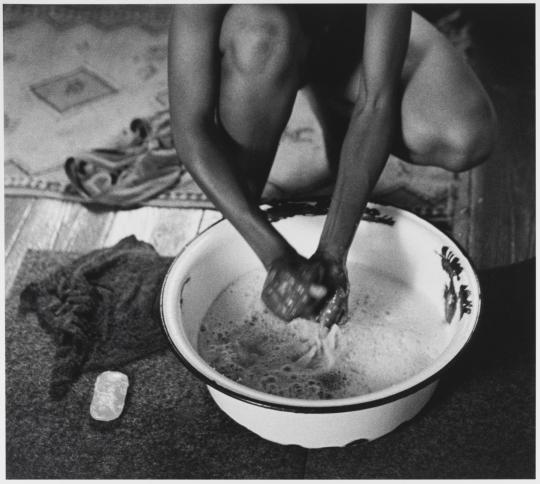
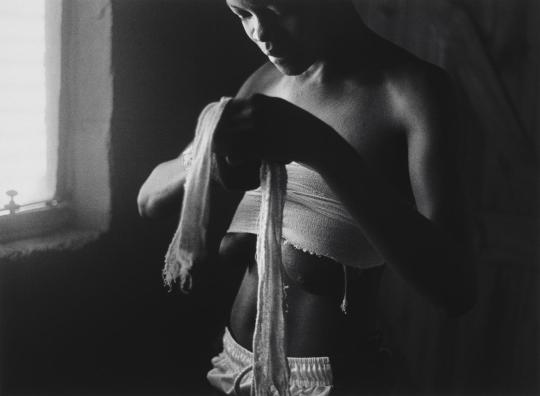
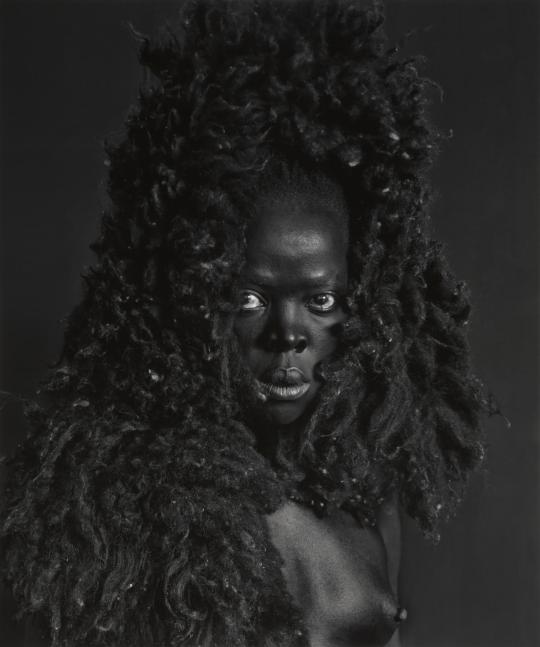
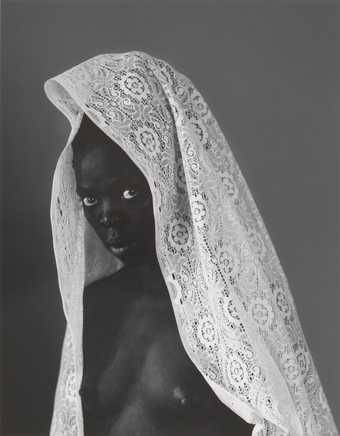
Queer artists 07/30 - Zanele Muholi
Zanele Muholi is a South African photographer and self-described visual activist. Of their identity, Zanele says, “I identify as a human being at this stage because of gender fluidity, and to avoid being confused by what the society expects out of us. I came out as a same-gender loving person, but because there was no Zulu name for it, I was called a lesbian. But we move on, transpire, transgress, and transform in many ways; so I’m just human.”
Their work explores the experiences of Black queer communities in South Africa, both celebrating love, strength and empowerment and documenting the ongoing realities of violence and prejudice. The participants, as Zanele prefers to call them rather than subjects, often look straight at the camera, meeting the gaze of the viewer. In other photographs, their faces are partly or entirely out of frame, maintaining their privacy. Zanele's work includes an ongoing series of 365 self-portraits entitled Somnyama Ngonyama, or Hail the Dark Lioness, which they describe as "an unflinchingly personal approach I have taken as a visual activist to confronting the politics of race and pigment in the photographic archive."
Zanele says about their work, "I have seen people speaking and capturing images of lesbians on our behalf, as if we are incapable and mute. I have witnessed this at Gay Pride events, at academic conferences, in the so-called women’s movement forums. Research opened my eyes even wider than the lens, and it made me feel autonomous. I refused to become subject matter for others and to be silenced.’
[Image descriptions:
Top left: Ordeal (2003) is a black-and-white photo depicting a dark-skinned person kneeling and wringing out a cloth into an enamel bowl. Only their lower legs and arms are visible.
Top right: ID Crisis (2003) is a black-and-white photo depicting a dark-skinned person binding their breasts with bandages. They stand in a shadowy room with light streaming in the window opposite them.
Bottom left: Somnyama IV, Oslo (2015) is a black-and-white self-portrait of Zanele, a slim, dark-skinned person. They are depicted bare-chested from the chest up, looking directly at the viewer, their face framed with dark hair.
Bottom right: Thembeka I, New York, Upstate (2015) is a black-and-white self-portrait of Zanele, a slim, dark-skinned person. They are depicted bare-chested from the chest up, looking directly at the viewer, their head and arms covered with a long, white, lacy veil.]
243 notes
·
View notes
Text
ok so. this isn't going to be as articulate as i'd like but i'm also very sleep deprived. i will do my best.
i've made the observation previously that fandoms in general tend to be Weird about gender non-conforming men. things like only seeing us through the lens of sexual fetish, failing to reconcile that a GNC man is still a Man, viewing us as being sinful/deviant/promiscuous/bad queer rep, etc.
but! there's something as of late that i've seen the OFMD fandom do. and it is new. i have never in my life seen something like this.
people are now talking about the GNC men in the show... as if they are women. and criticizing OFMD by bringing up misogynistic tropes... and applying them to the men.
which is... not how any of this works. full stop.
i've seen people insist that stede "became the love interest this season who has no arc or depth aside from being a boytoy to ed. and has given up his career for his man."
which, first of all, bonkers take. this entire season is about stede and ed independently going through their own developmental arcs and trying to figure out who they are + what they want. second of all............ stede isn't a woman!
seeing "ugh, he prioritized his love for a man over his career" framed as a negative instead of an active inversion. and it comes across to me as more homophobic than anything. "ugh... he did this for a MAN." well, yes. because stede is gay. and he is in love for the first time in his life. and he is allowed to want a soft, quiet life with his boyfriend. stede has always struggled in his comphet marriage and has wanted nothing more than to have agency to live the way he wants to and to be in a relationship that is fulfilling to him, with a partner that appreciates his quirks and interests. why are you treating this like a form of misogyny when it is about TWO MEN.
next, seeing people describe izzy hand's death as "fridging." i know that this is part of a wider problem of fans who feel the need to lash out because their favorite character is gone, and find a way to justify their anger (you're allowed to just be Mad btw. you don't need a reason.)
the problem is.... fridging is very specifically the critique of a WOMAN being killed off to further a MAN'S journey. and it also typically occurs at the BEGINNING of a narrative, because it is usually the CATALYST. a man is overcome by grief and wants revenge for what happened to his wife, or his girlfriend, or whatever. this does not work for a MAN being killed off at the END of a narrative, whose death does NOT inspire a wider revenge plot by the person grieving him. like, yeah, zheng wants revenge for her fleet being destroyed and auntie being put in danger, but ed isn't interested in fighting.
it's. well. it's very strange to me. and people are talking about these things as if it's a widespread issue. i'd much rather people talk about the actual issues GNC men face rather than inventing ones on the spot. are you going to insist that stede suffers from the "dumb blonde" trope too and how ruinous this is to Men Everywhere? or that ed's mental health arc is proof that women men are too emotional and should never be in a leadership position, lest a boy break their heart and they have feelings over it? please... some fresh air is needed. some sun. some grass.
(sidebar: i personally do not view izzy as GNC. doing drag one time does not a femme make, and he goes back to being femmephobic by the finalé. but this not change wider fandom perception of the character, which is why i've included him here. apparently, one instance of drag is enough to have people talking about him the same way people talk about the other characters. such is the curse of male effeminacy 😔)
9 notes
·
View notes
Text
i am trying to flesh out a thought relating to how people in radfem/gender critical circles talk about dysphoria, and a little bit with “rapid onset gender dysphoria” (ROGD).
when we talk about young people with ROGD, there’s usually this sense that it came out of nowhere and the person never had discomfort with their gender before, and the person wasn’t even gender nonconforming before suddenly coming out. and i agree that this is concerning! but it’s not any MORE concerning than a person who has been GNC since they could make decisions coming out with a trans identity.
when we talk about ROGD and there being “no signs” prior to a trans identity, what we’re doing is throwing GNC people—and especially kids—to the wolves; we’re pathologizing gender non-conformity in children if we’re willing to view gender non-conformity in children as evidence of “actual” transness or “actual” gender dysphoria.
but it’s not! a GNC kid who experiences distress at their body or puberty has simply been experiencing negativity and resistance to their way of being for much longer than a gender-conforming kid.
i actually worry about GNC kids MORE than ROGD kids because people question ROGD, but even GC people see a long history of being GNC in childhood and are like, “makes sense!” when they come out as trans. which is infuriating as someone who WAS incredibly GNC as a kid.
my gender nonconformity was always a point of tension between me and my surroundings, me and my popular culture, me and my peers, me and all media i consumed; add in that i’m a lesbian and i felt completely alien growing up, NOT because i was somehow a boy trapped in a female body, but because my society, on a hundred different levels and in subtle AND overt ways, was constant in its communication that how i was didn’t belong. so my trans identification does “make sense,” but not because it was Real Transness, but because it was encouraged in so many ways, it was almost inevitable.
i was listening to Gender: A Wider Lens this morning and they make the distinction between “gender dysphoria” and “sec dysphoria” as though “sex dysphoria” is a) a different phenomenon, and b) real. but it’s not! neither a nor b. sex dysphoria is making a different meaning out of alienation and distress from one’s sex than gender dysphoria. gender dysphoria is overt about one’s place in the gender role world, while sex dysphoria focuses on the body AS THE MECHANISM FOR FACILITATING one’s place in the gender role world. but they’re not different phenomena, they’re different understandings of the same phenomenon.
#radfem#detrans#radical feminism#detransition#gender critical#transgender#ftm#trans#radical feminist#transition
179 notes
·
View notes
Text
Umireread: Turn of the Golden Witch - Chapter 1: 'Furniture'
The following contains spoilers for the entirety of Umineko. Please do not read if you are yet to finish it.

And so Episode 2 starts… With a flashback inside of a flashback! Umineko is my favourite slice of life story.

That’s a very loaded statement when the broader implications are considered. On the one hand, there’s the gender identity angle, with Yasu considering herself a normal girl (to which we say, hell yeah), but it’s also batting away the notion of furniture which we know to be abnormal (in the sense of being non-human). Either way, considering what she’s been through, Yasu being able to view herself as “normal”, even if it has to be through the lens of Shannon, is pretty heartwarming.
Oh, and sure enough, the notions of furniture are mentioned 5 seconds later. I’m always relatively pleased when a line of thinking I have is immediately reinforced by the plot once I continue.
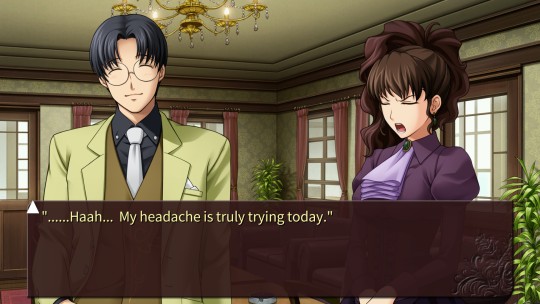
So there was a pretty rapid succession of thoughts here - the immediate reaction was “here we go, Yasu’s at it again”, but then I took into account that this isn’t necessarily in the realm of the message bottle, so this could just be a scene that was entirely reality. But then I realised that we’re in Shannon’s POV, so yeah this is entirely Yasu exacerbating Natsuhi’s pain once again.
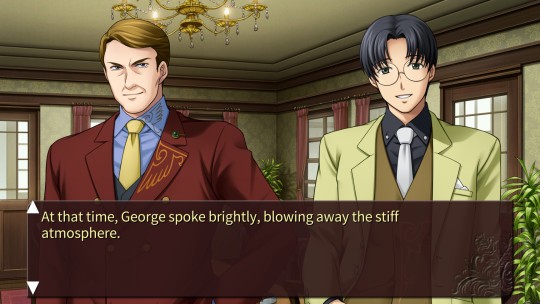
So far we’re getting a healthy amount of suggestion that, romantically, George was just “there”; that Shannon’s feelings for him didn’t particularly develop due to his character, but rather for just being an eligible option in the right place at the right time (similar to how Jessica saw Kanon).

Do they, though? My mind wanders to the many tales of how fake sommeliers can convince wine tasters of unusual methods of appreciating the wine; how people just assume a several hundred dollar bottle of wine must taste nicer than a cheaper vintage, when the difference could be entirely miniscule. Your perception is muddied by what you inherently believe must be the truth. It seems like an odd thing to focus in on - a rich family having expensive tastes - but when Umineko is so concerned about reevaluating your axioms, questioning why you believe the things you do, this does feel like another microcosm of the plot.
Meanwhile, Krauss joins in with Eva to bully Natsuhi regarding her headaches. An indication that the Ushiromiya blood is closer with each other than the borrowed wombs they parlay with? Or another case of Yasu inflicting as much misery onto Natsuhi via the narrative as possible?
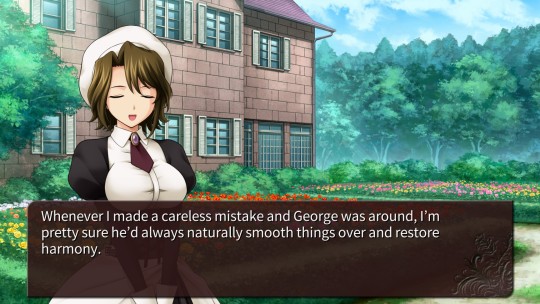
“Pretty sure” is a funny phrase to use here - it’s meaningless at a glance, but once again, it’s hammering through the themes of glossing over reality with a layer of fantasy. Did he? Who knows. But we can believe he did to improve our view of him, can we not?

As someone who doesn’t remember the intricacies here particularly well, does JESSICA implant the ideas of romance into Shannon? That’s VERY interesting if so.
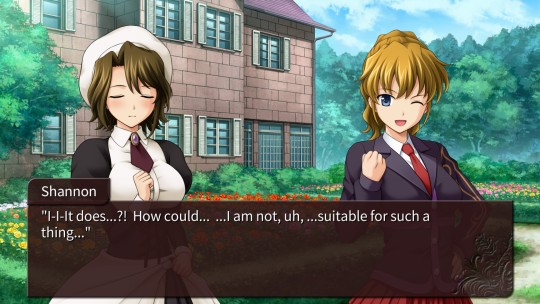
I suspect a good majority of early Episode 2 is going to be Ryukishi intentionally wounding anyone who is here for a re-read. The Furniture connotations hit hard.

And so the true villain of Umineko shows itself! Heteronormativity!
I’m using that term a little loosely - in truth, I should really be using the broader sense of “societal expectations”, since that’s the crux of what’s going on here. Shannon mentioned being a “normal” girl, but what does that mean, exactly? What is “normal”? Generally, a concept decided by the wider views of the society that surrounds us, rather than something derived from within. However, heteronormativity is a huge factor in the dangers of social expectations that Umineko highlights, as the expectation for people to enter a monogamous (straight) relationship, rampant in your teen years, can greatly shape and warp how you grow as a person.
You may think I’m talking from my own experiences there. You’d be right. You may be inclined to believe that heteronormativity greatly warped my sense of self, growing up as an asexual teenager who (at the time) thought they were strictly a cisgender male. You would also be right - I won’t be getting specifically into the personal issues I faced because of this, but you’ll definitely see a hard bias against the concept on my end (which, fortunately, Umineko also ensures to chastise).
This was a lot of words to say that “Jessica growing up believing she had to be a girly girl who likes boys warped her as a person and was the first domino in this ensuing tragedy”.

“If George were to appear at a time like that, she’d have no chance of keeping her cool.”
Anyway, here’s George.
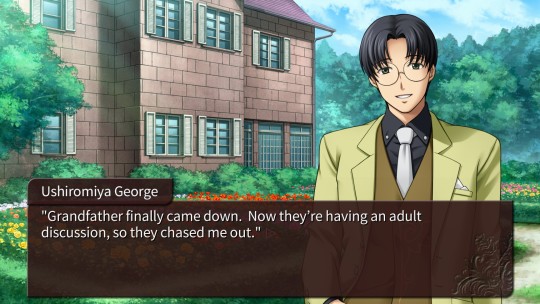
Did they, eh? The start of Episode 2 is fairly ambiguous when it comes to the place in the timeline, so it’s interesting getting details that can help pin it down. I’m hesitant to say that this is fabricated - there’s no way Eva would go along with a fake Kinzo appearance, so surely we’re at least 2 years back?

After mentioning generational trauma and the cyclical nature of abuse in the Episode 1 Wake, it definitely stands out more whenever the mentions of abuse crop up. Thanks Kinzo.

And here we are - THE moment that the feelings take root.
One thing which I think is important to address before we progress is the nature of Shannon’s feelings - I, personally, don’t like the Shannon-George dynamic, and a big part of it is this sense that she’s only pursuing him because she wants a “normal” romance in her life, and that the walking definition of milquetoast finds himself as the most eligible option in her position. She doesn’t love George, she loves the idea of George - and of course, that can develop over time, but that’s a questionable foundation.
But here’s the thing - does that matter?
There’s an excellent video from Philosophy Tube centred around Brexit (of all things), which raises a great point about people voting when they have been misled or deceived - while they have made an “incorrect” judgement based on what they knew, does that necessarily mean that vote is invalid? Are those feelings invalid?
In my personal opinion, yes - I’d say so. But as with most philosophical questions, a personal answer is not a true answer; my thoughts are not reflective of a greater truth of the universe. You can argue that, if someone is fed lies, and they make a vote based on those lies, then that vote is still perfectly legitimate. I might not agree with you, but the argument is there to be made.
I bring this up because it’s reflective of Shannon’s situation - because I think her feelings for George developed in the “wrong” way, I’m not supportive of the relationship. But does that matter? Shannon still has those feelings, regardless of how they developed. My preconceived notions cannot override that. As before, going forward, I’m likely to be critical of George and Shannon - but my distaste does not override their legitimacy. Anyway, moving forward.

Very funny to see the narrative also writing George off as “average”.

I think it’s worth mentioning heteronormativity again here in terms of George being influenced by it. Again, the choice word is “unfortunately” - completely telling of the expectations that George has thrust upon himself. He, too, is weighed down by society demanding that he enters a normal relationship; and that’s before any of the Ushiromiya expectations factor into it.
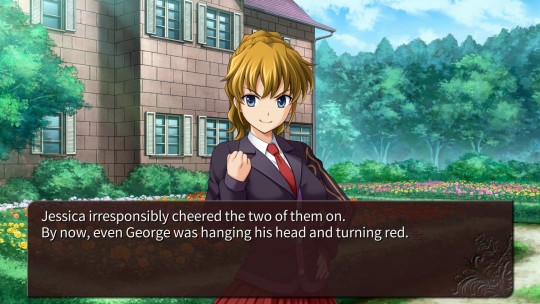
Highlighting the use of “Irresponsibly” here.
Honestly, this scene is actually kind of phenomenal on a reread - fueled by society at large, Jessica’s desire for romance causes her to ship George and Shannon together - pushing them close even when they may not have been otherwise - which in turn causes her to spiral and doom her away from Kanon. I am a sucker for tragedy and we are delivering right now.

And here we juxtapose societal expectations with familial. Not only is George expected to marry and start a family, he’s expected to enter a political arrangement, with him being used as a vessel for the Ushiromiya that cares not for the human behind his position. The former expectations twist and warp the human; the latter ignores it entirely. Which is worse?
Eva’s discussion about how she grew to love Hideyoshi rather than marrying because of it is an interesting parallel to the discussion we’ve just had regarding Shannon falling for George for just being there. It might just be my interpretation of it, but it feels like Umineko wants to paint that Eva-Hideyoshi dynamic as a negative thing, which is an interesting reflection of how it doesn’t seem to do the same for Shannon-George. But again, maybe that’s my preconceived notions tainting the scene - it very well might just be alluding to it while passing no judgement.

Not content to dehumanise just her own son, Eva has it out for the servant girl as well.
There’s a line here about George being in college and getting “wonderful grades”, so that probably places him at about 20-21? He was born in March, so that would have made him one of the youngest when he started school in April, so he’d have entered university at 18 and graduated at 21 or 22 depending on whether he went for a Bachelors or a Masters. So with Kinzo alive, we’re probably 2-3 years in the past?
I probably shouldn’t care about this too much - Ryukishi tends to play fast and loose with the span of time in his works (fall of the Soviet Union, anyone?) so trying to pin hard numbers on this is likely an exercise in futility.
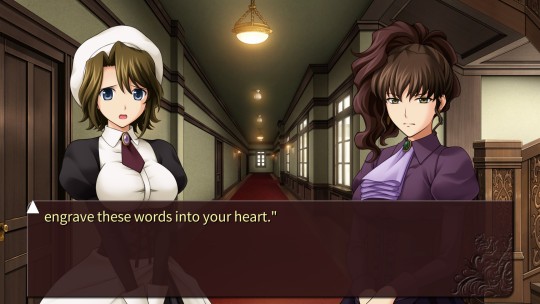
Interesting - engraving into your heart conjures the same phrasing that “Kinzo” gave Natsuhi during her study scene in Episode 1. A sly hint that such an exchange was fabricated by Natsuhi, given her use of the term here?

It’s interesting how the POV bounces back between “I” and a third person “Shannon”. Possibly Yasu taking time to distinguish or dehumanise herself?
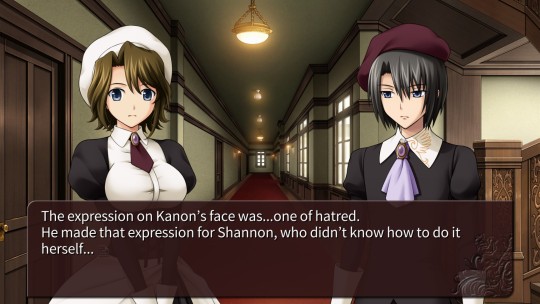
It’s interesting how Kanon is used as a way for Yasu to express the internal emotions that she’s not allowed to paint onto Shannon. There’s quite a few scenes where Shannon isn’t allowed to react and Kanon does it for her.

And so Yasu was so perturbed by Eva and Natsuhi’s words that she added a new voice to her internal dialogue.
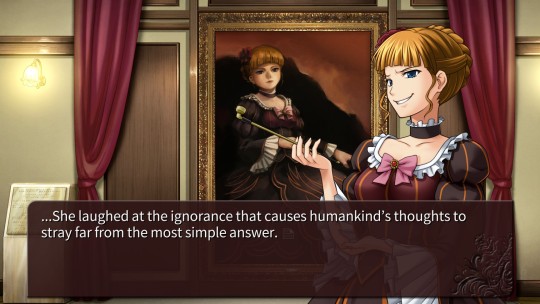
Did you know that the answer is love? I wonder what happens if you extrapolate that idea to the plot as a whole. I’m sure there’s no relation.

So what’s the implication here? Yasu is giving herself a pep talk into using the bombs to destroy the shrine? But if that’s the case, that narrows the window significantly, since Kinzo died pretty much immediately after Yasu solved the Epitaph, right? So either this takes place at a very specific moment in time 2 years ago, they somehow faked Kinzo coming down to get George to leave but somehow Eva didn’t become suspicious, or the timeline isn’t consistent.

Ah, so it’s about conformity - an amusing sister topic to our previous discussion on societal expectations. It’s about Yasu needing to do something drastic, to ensure that something will change; that the life of furniture does not continue forever. Blowing up the shrine, and the eventual Epitaph Murders, are a chance for her to wrestle back control of her life; to have a say in what happens, rather than be a lower life form working around others. Eva and Natsuhi were the tipping point; the moment she starts to think more of herself, they both try and rip it from her, and she’s no longer willing to sit back and let that happen.

There’s a time limit on this as well, which almost certainly contributes to this being the inciting incident for the birth of Beatrice inside of Yasu. A perfect storm of pressure on all sides.
Kanon’s arrival here is fun to think about - after all, scenes with all 3 of them are still just a raging internal monologue. These should be very interesting to think about going forward.
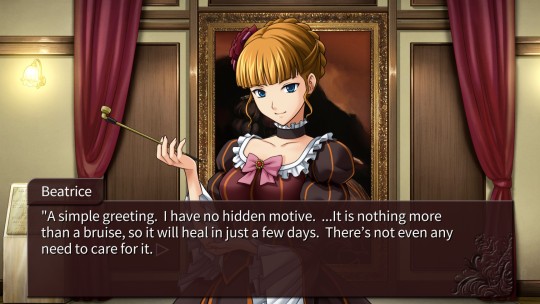
I wonder how much of this is reflective of reality - of course, none of this could have happened, as it was a mutable mark that healed in a few days regardless; but it’s more interesting to think of fantasy adorning reality rather than replacing it. Perhaps Yasu burnt herself with cleaning chemicals - as an act reflective of willpower. To injure oneself and feel the pain; after all, furniture cannot feel pain, so it’s a pledge to herself to be human.

And from that moment on, Shannon was tormented, doomed to suffer the curse we know as being human.
8 notes
·
View notes
Text
3 notes
·
View notes
Text


lady crystal is a man - jeoneona
crystal, an illegitimate son of a concubine, has been raised as a girl since birth in order to save her life. but when she’s finally about to be married off, she seeks refuge with a political enemy of her family in a fake marriage. her husband, the duke, is a woman forced to take up the position of duke in order to protect her family’s title
the couple: boy do they ever have a lot of baggage. the duke is sweet to crystal and finds her amusing, but so far has remained emotionally distant. crystal is sheltered, naive, and adorable. it’s early days so i’m interested in how they’ll finally bond
story & setting: historical with very light fantasy elements. it has a dark, almost gothic tone, and it’s been really focused on crystal and the complicated situation surrounding their fake marriage
the art: gorgeous. absolutely impeccable

this is a story about a Lot Of Gender Stuff (spoilers, my thoughts on queer readings, potential transphobia, and magical puberty blockers):
it’s a gender swap/role reversal story and that makes it, consequently, Complicated when viewed through a queer lens
crystal is basically in a marina fear & hunger situation where she’s been raised as a girl from birth in order to save her from a terrible fate. she’s not exactly uncomfortable being a woman, since she’s been one her whole life, but she still dreams about cutting her hair and trying men’s clothes someday when she’s fully escaped from her family. she’s very afraid of her identity being revealed, which would lead to her being killed by her family or potentially having her marriage annulled, so i’m very interested in how she’ll cope in a situation where she no longer needs to worry about that and can choose freely
the duke has a much more bitter relationship with her gender identity because she was happy as a girl before suddenly having the burdens of a son forced on her by her father. she’s accepted it as her responsibility, but it’s more like a mask she wears than anything she embraces. her story is actually very similar to the premise of “finding camelia”, another gender-subversive manhwa where a daughter is forced to live as a man in order to fulfill a societal role.
the pronouns for both characters are situational- the duke is called she and a woman by those who know her, but to the wider world she is still a man, he, and duke.
crystal is mostly called she, even by her closest friends who know her secret. i think they use he a couple times, but usually revert back to feminine terms quickly.
in text, there are some “wait a minute, aren’t her hands large, doesn’t she seem tall, she’s got a husky voice” moments with people who observe her which are just like. i understand that the tension regarding crystal’s secret is a big plot point but Was That Really Necessary. i get he/him’d based on my husky voice too it doesn’t make anybody transvestigator of the century it makes you Nosey
on that note, crystal’s secret does get revealed when she’s unconscious, which takes away a lot of her agency in a morally dubious way, while it doesn’t cause anyone to be hostile to her, some characters are just downright pushy about crystal’s gender. when they discover her secret, they switch to using mostly masculine pronouns for her when discussing her privately. however, no one outs her or reveals this to her except for one situation (below)
one interesting thing about the plot is the existence of “magical puberty blockers”, which crystal has been taking for years. however, the ingredient is harmful when taken for a long time and is slowly poisoning her, so she has to be taken off them. as of the current official uploads, we haven’t seen the consequences of that or how crystal will feel about it given that she’s still so afraid of her agab being discovered. this plot point is the only instance of her identity being leveraged against her, because of the danger involved in continuing to take them. in order to make her stop, someone has to know she’s even taking them basically
i’m cautiously optimistic about the direction of the story! i love the characters and want to see them be happy together and free from the societal constraints of gender and gender roles
#historical romance#historical fantasy#manhwa#manga post#lady crystal is a man#shoujo#manhwa recommendation
3 notes
·
View notes
Text
Dear English fans,
Utatane Piko and SF-A2 Miki are NOT siblings!
Here’s what I mean:
(I just discovered this misinformation spread because of an old talkloid shitpost on YouTube and I’m responding to this from the perspective of the Japanese fandom. These two are not well known overseas but on Nico Nico Douga, 9 times out of 10, they’re often shipped together. Gobou-P and Mahiruno-P are great examples. While there’s nothing inherently wrong with it; it’s a cute headcannon for them to be brother and sister, but it’s typically unusual. Allow me to explain for the sake of my talkloid series and in general.)
Yes, Utatane Piko and SF-A2 Miki were owned initially by the same company called HEARTFAST back in 2008-2009. This company went bankrupt and the site no longer exists. That much is true.
Miku and Luka are siblings in the sense that they’re both from Crypton and were also originally meant to be counterparts, but those two are completely different and are not “blood related”.
Miki’s quality took a hit from the lack of funding hence her infamous pitching (ta, wa, etc.) and volume issues (soft a, i, loud o, e), even though at the time she had a wider range than Miku and was among one of the most realistic banks. I think Miki tuners should take pride; because if you can tune her, then it’s very worth it and it makes using newer banks feel like cakewalk.
Piko got luckier with quality but he also suffers some phoneme clipping issues, like the N\ squeak or his dampened “da” and “ga”.
It was an awful shame they got split up and overshadowed by other releases. I don’t know if we could petition AHS to purchase Piko from Sony today but we could try. His provider is still active and well, and survived a kidney transplant thanks to his mother.
The Voice Providers:
Miki Furukawa from the band Supercar and later LAMA is from Hachinohe in Aomori Prefecture. (That’s in northern Japan just under the shores of Hokkaido.) She was born February 19th, 1979. Her signature bass guitar is the rare Yamaha SBV-800MF (SB-5a/7a and SBV-550) in blue.
Piko, on the other hand, is from Kobe, in the Kansai region just south of Tokyo (yes, he has the accent!). He was born March 11th, 1988. His start to fame was covering classic vocaloid songs since supecell’s “Love is War” on Nico Nico Douga and the amazing fact that he could sing as both genders with his best friend Sekihan (who has his own band). He’s physically very attractive and is still mistaken for a girl in short glimpses (to his amusement), but he has made it clear he is not gay and likes women (in fact, he’s very quick to remove a heavy wig). If he does “drag” then I’ve noticed it’s usually in a funny trolling sense or as a talent.
I’ve been listening these two practically my whole life along with Yuri Masada and Fukase from Sekai no Owari, because I’m a music junky, and they’re absolutely worth looking into.
Piko and Miki are almost a decade and half a nation apart, they were only under the same music label Ki/oon Records for a while. They’ve most likely never even met.
If they have met, I’ve rarely if ever heard Piko speak of his bank, let alone Miki. I know he has a copy of his own bank, and he's made music with Miku, Gumi, Rin and Len before (Chuutoro-P). Piko is still doing music work, streams, and YouTube now. Miki’s getting her SynthV release in December 2024 and she is doing quiet live shows and fashion work.
(In my series I decided to make them 1 year apart similar to their release dates.)
Their Designs:
While they are counterparts, no part of them is essentially “blood related”.
Piko’s iconic hair is the same as his mother’s to honour her, Utatane’s cowlick is just to differentiate.
Vocaloid Miki was about to have the similar short hair as in real life. I know this because I bought her artbook with KYMG’s concept designs. Supercar made a lot of laid back rock and almost meditative, space-like/romantic songs you could groove out/fall asleep to, hence her space theme. Furukawa has a cover of Saihate so you could tell she enjoyed Miku’s kz/Livetune era with songs like “Light Song” and “Packaged” (2008).
Piko’s entire design is specifically based on the discontinued (sigh) Yamaha RGX-A2 electric guitar in aircraft grey (other colours red, black, and dark blue), the aux jack to usb tail on the hem of his outfit falls with the computer instrument metaphor. It makes sense the two would be guitar and bass, since Miki is primarily a bassist who can sing and use a keyboard.
These two also have the same robotic joint markings, Piko’s are just harder to see because of his black sleeves and because his legs are covered, but people forget the elbow areas on the sleeves are actually transparent.
In conclusion:
Yamaha (I believe) wanted to launch an “Artist Edition” series at the time based on real musicians. The voices were Miki (Furukawa), Piko, Gakupo Kamui (Gakt), and Lily (Yuri Masada). If there were others, I don’t remember, but the “development code” thing was likely Heartfast’s idea pertaining to this theme by giving the two prototype sci-fi joints.
If the western fandom’s definition of “siblings” is by same company umbrella, then I accept that. Otherwise, I personally ship them very hard here because they’re totally unrelated and my goal is to give them the love they deserved and spread the word.
I hope this rant was educational.
Cheers!
#piko x miki#sf-a2 miki#talkloid series#vocaloid#転生お茶-p#heartfast#music nerd rant#vocaloid2#vocaloid4#Miki Furukawa#have fun guys#they’re highly capable voice banks so let’s get creative#piko miki 101
2 notes
·
View notes
Text
Portal 2 Through a Critical Feminist Lens
An essay I wrote on how the plot and characters of Portal 2 can be viewed through a critical feminist and queer lens. Essential background reading for any of my Portal fics, as it establishes what I believe are GLaDOS' real motivations for testing and other very important details about the characters in my stories.
Can also be read on A03: https://archiveofourown.org/works/41351046
⚠️Content Warning ⚠️
This essay discusses the oppression of women through sexual, emotional, and physical violence, both real and in-game. It also contains a mention of suicide. Nothing in this essay is described in graphic detail, although it may still be upsetting. I understand that these themes are triggering for many people.
Feminist theory is a critical lens dedicated to studying the depiction of women in media in a world where those who identify with the female gender are discriminated, humilated, and put in lesser positions of power than men. It aims to expose how real-world misogyny in the real world seeps into literature, and show us more progressive forms of uplifting women through media. Valve’s 2011 video game Portal 2 features two characters, that, when studied via a feminist critical lens, challenge norms of male political domination and heteronormativity. Chell and GLaDOS also subvert traditional gender expectations, and work in tangent to take down men that are abusing their power. Such a story is very relevant to human nature and wider society through the feminist lens.
Lois Tyson, a feminist critical scholar, defines the critical theory as examining
‘ "...the ways in which literature (and other cultural productions) reinforce or undermine the economic, political, social, and psychological oppression of women" [1]
It identifies and analyses various positive and negative depictions of women, ranging on the scale from featuring modern female characters that stand up for the rights of themselves and others, to presentation of women as being ‘meant to stay in the kitchen’ to unnecessary objectification. Critical feminism also reveals damaging discrimination of women and compares to real life issues, such as the lack of women directing top-grossing movies, to draw attention to social injustice. Critical feminism is split into camps with slightly to significantly different motives, viewpoints, and actions. A general consensus on core beliefs in critical feminism, however, was concluded upon by Tyson:
Women are oppressed by patriarchy economically, politically, socially, and psychologically; patriarchal ideology is the primary means by which women are oppressed. In every domain where patriarchy reigns, woman is other: she is marginalized, defined only by her difference from male norms and values. All of Western (Anglo-European) civilization is deeply rooted in patriarchal ideology, for example, in the Biblical portrayal of Eve as the origin of sin and death in the world. While biology determines our sex (male or female), culture determines our gender (scales of masculine and feminine).
All feminist activity, including feminist theory and literary criticism, has as its ultimate goal to change the world by prompting gender equality.
Gender issues play a part in every aspect of human production and experience, including the production and experience of literature, whether we are consciously aware of these issues or not.
No educated person can deny the fact that rape, objectification, stereotyping, lack of freedom of speech or movement, and other forms of discrimination are a major issue for women across the world. For example, a man in the United States pleaded guilty of raping a 14-year-old girl, yet got no jail time. [2] The newly imposed abortion laws in the US restrict women’s right to bodily autonomy. [3] Moreover, a lesbian couple in London were brutally attacked on the bus, simply for refusing to entertain a gang of teenage boys.[4] Critical feminism exposes how forms of discrimination seep into media, and analyses how women can be better represented and empowered through literature. Such an example of oppression of women in fiction is the common occurrence of female characters being written with less depth than their male counterparts.
Contrary to popular belief, this critical theory doesn’t always brand a text as purely ‘feminist’ or ‘not feminist’. Novels, films, plays, music videos, and other forms of creative expression are made up of a complex web of features, and some aspects of a text may empower women in some way or another, while another may reinforce typical patriarchal oppression. Portal 2 is a prime example of this. Interpretation of the video game’s story may differ depending on what critical lens it is viewed from.
How does Portal 2 relate to feminist theory?
Portal 2 is led by two female characters, and takes place in an unspecified (but implied to be very long) after the events of the first instalment. Portal introduces the story with Chell, a woman who is used as a test subject for experiments testing the Aperture Science Handheld Portal Gun Device, and GLaDOS, a sarcastic, sly, and vengeful robot who was built to monitor testing. The dynamic between these characters is integral to the development of plot and theme from the beginning of the series.
GLaDOS appears to be with helpful intentions at first, but as Chell completes more and more tests without dying, she reveals her hatred of the test subject’s existence. Despite the fact that Chell cannnot speak, we can tell through her actions that she will do almost anything to take down GLaDOS and escape from the hellish labs of Aperture. The game concludes with Chell’s murder of the machine and her subsequent ‘cryosleep.’ None of the motivations for GLaDOS’ cruelty are touched upon until the sequel, however; and Portal 2 has a deeper story that allows for a much more interesting analysis through the critical feminist lens. For these reasons, I will be focusing on the second instalment for this essay.
Later on, Chell and GLaDOS are forced to work together to take down past and present patriarchal oppression. They still have their points of conflict, but when they are confronted by the reality of what two men are doing to them, they are no longer enemies. Most players, who originally disliked GLaDOS for her seeming lack of sanctity for human life, find themselves strongly supporting both female characters, feeling angry when the enemy gains power, and sorrow when they experience unnecessary suffering. By the conclusion of the game, the audience can closely identify with who was once the brutal antagonist. Her bitterness towards humans is revealed to be motivated by the fact she was enslaved as an immortal overseer of pointless experiments. We find out that GLaDOS was once human, and that she despises patriarchal ideology. Men robbed her of the freedom to pursue anything that is not for their scientific benefit and the opportunity to die against her will. Therefore, it is clear why she used to show no remorse murdering humans.
When viewed through the critical feminist lens, this part of the game shows us the themes of patriarchal oppression, hegemonic masculinity, and the ownership of women by men. At a cursory glance, the power that men exert over women in Portal 2 appears to be a reinforcement of sexist gender stereotypes. However, the way in Portal 2 depicts patriarchal ideology and gender stereotypes does not praise them. It shreds them apart. Disturbing impacts of toxic masculinity left unhinged are shown front and centre. Such evil has a profound influence on Chell and GLaDOS in particular. A dead man’s craving for power is the reason why Chell has been stuck in a hellish laboratory she’s been trying to escape from for hundreds of years. Even more jarringly, Chell is the only human she loves, yet GLaDOS can’t express her feelings because the Perpetual Testing Initiative installed into her may involuntarily compel her to kill Chell in the name of science at any point. She makes the choice to set Chell free, since the human wants nothing more than to escape, but also because she is frightened that the instinct to test that was forced upon her (by men) will cause her to hurt Chell even more than she already has. Feminism is portrayed as morally right, and patriarchal ideology is shown as being very wrong. As a result, Portal 2 is a feminist text.
Hegemonic Masculinity and control of Women and its role in Portal
During the 50s to 70s, Cave Johnson was the CEO of Aperture Science. He speaks on pre recorded lines addressed to the test subjects in his laboratory, and is heard speaking when Chell traipses through old Aperture with GLaDOS. He conducted questionable experiments on people, such as turning blood into gasoline and injecting test subjects with mantis DNA. [5] Only recordings of his voice are heard. However, it is clear that from his first announcement that he abuses his power in the name of science. He fires an employee who uses a wheelchair because ‘ramps are expensive.’ His lust for scientific knowledge is shown to be bordering on sadistic when he says:
"Good news is, the lab boys say the symptoms of asbestos poisoning show a median latency of forty-four point six years, so if you're thirty or older, you're laughing. Worst case scenario, you miss out on a few rounds of canasta, plus you forwarded the cause of science by three centuries. I punch those numbers into my calculator, it makes a happy face."
From just several quotes, it is obvious he will let very little stop him in his quest to satisfy his curiosity. Cave displays little respect for women and several traits which are integral to the concept of hegemonic masculinity:
Hegemonic masculinities are at the top of the gender hierarchy and exist in relation to subordinated gender constructs. Traditional constructions of hegemonic masculinities include risk-taking, self-discipline, physical toughness and/or muscular development, aggression, violence, emotional control, and overt heterosexual desire. [6]
‘Hegemonic’ is defined as ‘ruling or dominant in a social or political context’ which his masculinity most definitely was over Aperture. His actions and power over the facility also line up with Lois Tyson’s first two uniting beliefs of critical feminism and reinforce traditional gender roles. He says ‘I’m Cave Johnson. I own this place’ implying that his masculinity gives him the right to do what he wants, regardless of whether or not it is morally stable. He also shows significant arrogance, a common trait of the patriarchal ideology and hegemonic masculinity. He insinuates that people identifying as feminine, or expressing themselves as female, are weak and pitiful, a problematic gender stereotype:
"I'm no psychiatrist, but coming from a bunch of eggheads who wouldn't recognize the thrill of danger if it walked up and snapped their little pink bras, that sounds like 'projection'."
It is implied that he has a partner named Caroline. She served as his assistant. Although a relationship between the two was never directly stated, he speaks of her as if he finds her physically attractive (She’s pretty as a postcard’.) A portrait of them is also located in old Aperture. During the time period Cave was alive, it was unusual for a man and a woman to feature in a painting together unless they were in a relationship. Professor G. Christopher Williams, Associate Professor of English at the University of Wisconsin makes a statement on this:
"By fulfilling the expected obligations of a 1950s 'wife,' Caroline sounds as if she might as well be married to Johnson, and after all, given Johnson's alignment with American exceptionalism and what it can achieve through technology, he is the 'science' that she has married herself to."
—G. Christopher Williams, Associate Professor of English at University of Wisconsin - Stevens Point.[7]
Sadly, the full brunt of Cave’s abuse of his masculinity and power is forced upon this woman.
In the 1950s, Cave acts in a gentle manner towards her, and holds her in high regard (‘She’s the backbone of this facility,’ ‘She’s a gem.’) His complimenting and allowance of her to hold such a high role is most likely what caused Caroline to gain trust in him. As he is dying of an experiment gone awry in the 70s, however, he becomes aggressive in desperate efforts to continue his research after he is gone.
The point is: if we can store music on a compact disc, why can’t we store a man’s intelligence and personality on one? So I have the engineers figuring that out now. Brain Mapping. Artificial Intelligence. We should have been working on it thirty years ago. But I guess it’s too late for should haves and what ifs. I will say this - and I’m gonna say it on tape so everybody hears it a hundred times a day: if I die before you people can pour me into a computer, I want Caroline to run this place. (Now) she’ll argue. She’ll say she can’t. She’s modest like that. But you make her. Treat her just like you’d treat me. Hell, put her in my computer. I don’t care. Just make sure she’s taken care of. Allright, test’s over. You can head on back to your desk.
Cave’s main motivation for uploading Caroline’s consciousness is not because she cares about her as a person. It is expanding his regime of relentless and dangerous scientific research, blind to moral consequences, after he is dead. If he truly cared about her, he would have offered her the choice to die a natural death. Cave chose Caroline as the most capable candidate for his replacement and gradually manipulated her into her trust until he had the legal power to force her consciousness into a machine in the worst act of his hegemonic masculinity. Caroline assertively states ‘I don’t want this’, but he doesn’t listen to her. Afraid, she says again, ‘Mr Johnson, I don’t want this.’ This has no effect on him, and she is still installed into GLaDOS. He is abusing his power and showing the worst integral traits of hegemonic masculinity: aggression, violence, and emotional control. From the context of the previous quotes, we know that Cave justifies his actions towards Caroline with his status, masculinity, power, and scientific prowess. Perhaps even more disturbingly, it is possible that Caroline was murdered for this purpose, as Cave was still alive briefly after GLaDOS was activated. These events compel the audience to feel loathing for Mr. Johnson. They also draw to our attention the injustice of abuse of power and masculinity. Cave used his hegemonic masculinity as an excuse to abuse, control, manipulate, and gain property rights over women.
Cave also displays ownership over Caroline by forcing her to become GLaDOS for his own ambitions, and Caroline is very passive to this until he tells her what he plans to do. He is determined for his research to continue after his own death, and therefore is very possessive of her. She only speaks to and as a response to Cave. Her tone of voice and the ways in which she addressed him show submission and a sense of being lower in the patriarchal structure of Aperture than he is (‘Yes, sir, Mr Johnson.’) She never gains an opportunity to express her personality, beliefs, morals, or emotions outside of the context of her partner and his actions. From a patriarchal point of view, Caroline is nothing more than a shadow, an assistant to a man who would be useless if not working with Cave. In What’s the story? Feminist story, narrative, address, we can find striking insight into how patriarchy reinforces the idea that women in relationships are owned, controlled, and defined by their partners through a real life suicide account: [8]
Bhuvaneswari had known that her death would be diagnosed as the outcome of illegitimate passion. She had therefore waited for the onset of menstruation. While waiting, Bhuvaneswari, the brahmacarini who was no doubt looking forward to good wifehood, perhaps rewrote the social text of sati-suicide in an interventionist way . . . She generalized the sanctioned motive for female suicide by taking immense trouble to displace (not merely deny) in the physiological inscription of her body, its imprisonment within legitimate passion by a single male. . . . In this reading, Bhuvaneswari Bhaduri's suicide is an unemphatic, ad hoc, subaltern rewriting of the social text of sati-suicide. (308)
The line ‘imprisonment within legitimate passion by a single male’ is especially relevant. We see that by simply being in a relationship with a man, her individual identity was erased, and her right to freedom became restricted by the desires of her partner. She became mentally, and later literally, imprisoned by the hegemonic masculinity and scientific ambitions of Cave, and the audience is angered that the patriarchal system deemed Caroline as worthless without Cave. Caroline would not at first anticipated that he would begin taking control of her for science; for if she did know, why would she be in a relationship with him? As he succumbed to illness, he gradually became more and more crazed about science, and desperate to control her. In 1952, She most likely would have been able to pick up on the warning signs of a heightened desire for control later on in their relationship, but was too frightened to confront him, noting her extreme submission to him in her voice lines. Bhuvaneswari commited suicide because she wanted to free of men controlling and defining her identity on the basis that she had a sexual relationship with a man once. Perhaps Caroline’s fervent distress upon being told Cave desired to transfer her consciousness to a robot after she died was motivated by something similar. It is evident that, for one thing, Caroline is utterly petrified at the prospect of becoming a hyper-intelligent, all-powerful, immortal supercomputer. And rightfully so! Decades of witnessing alarming experiments may have decreased her sensitivity to moral ambiguity; but little apart from Cave’s signs of gradually sliding into insanity could have prepared her for this. In the context of Bhuvaneswari and Portal 2, it is also feasible that she opposed becoming GLaDOS because she did not want to be controlled by the motives of her husband and essentially be owned by him for the rest of her existence. Such a motivation is likely, considering that GLaDOS kills all of the scientists (possibly including her husband) with neurotoxin shortly after she is activated, murders every test subject except for Chell, and states outright that she loves revenge. She also attempts to poison and incinerate Chell multiple times in the first game, and doesn’t begin to show respect for her until memories of being Caroline are triggered, and realises they are both fighting the same ultimate enemy - the patriarchy. Only at the conclusion of Portal 2 does she finally gain the chance to displace (not merely deny) in the physiological inscription of her body, its imprisonment within legitimate passion by a single male.
The consequences of patriarchal ideology given far too much power are portrayed as being very negative, and from this we can uncover a subtext about how men must regulate their hegemonic masculinity. Cave’s actions were justified by his status and power as a male CEO, and his desire to extend his research for his own sake after his own death resulted in an almost constantly tortured existence for his wife. The Perpetual Testing Initiative installed into the mainframe is a notably disturbing action Cave took in the wake of his hegemonic masculinity taking over. During her short time disconnected from the mainframe, GLaDOS’ behaviour changes drastically. She uses less sarcastic, bitter remarks against Chell simply for being human, and instead displays amiability towards working with Chell and a determination to overcome another character reinforcing the patriarchal ideology -- Wheatley -- albeit to a lesser extent than Cave did. A typical statement from GLaDOS regarding Chell before she was taken off the mainframe is:
"This next test involves turrets. You remember them, right? They're the pale spherical things that are full of bullets. Oh wait. That's you in five seconds. Good luck."
GLaDOS is still very frustrated and angry, as she usually feels, as she travels with Chell outside of the mainframe. However, she is strikingly less hostile towards Chell, and even displays concerns for her safety (‘Just remember to land on one foot…’) Co-operating with her was probably something she would very rarely consider under Cave’s mainframe programming, even in dangerous situations where she required help from Chell. As she begins to recognise the recordings of Cave’s voice, she is overwhelmed with memories, and uncovers the emotional part of her - Caroline - that had been buried for thousands of years.
"Look, you're... doing a great job. Can you handle things for yourself for a while? I need to think."
At first, she seems wary of this man, but the recording of Cave shouting about combustible lemons excites her (“I like this guy!”) After hearing about how he abused his employees, possibly dredged up the forgotten trauma of being forced to become GLaDOS, and bringing up to Chell the ‘testing euphoria’ installed in the mainframe, so strong that it often overtakes the conscience, she still wants to return to it.
"The body he's (Wheatley - the secondary antagonist) squatting in - MY body - has a built-in euphoric response to testing. Eventually you build up a resistance to it, and it can get a little... unbearable. Unless you have the mental capacity to push past it."
However, as she makes clear, GLaDOS has some resistance to the euphoria, and therefore has a small degree of free will while attached to it. Her motivation to get back is also motivated by the fact that she is attached to a potato at this point, and must regain her power as soon as possible to stop Aperture from being ripped apart. Wheatley, like Cave, was going insane with lust for power. She had reattach to the mainframe in order to save Chell’s, as well as her own, life. Cave installed the test solution euphoria response in an aim to make GLaDOS do almost anything to achieve what were ultimately not her own goals and desires, but his. This alone is very disturbing. Not until the end of the game do we discover GLaDOS’ true feelings for Chell, and the utterly tragic extent to that a dead man’s selfish hegemonic masculinity affected her.
After Wheatley is defeated by Chell, she shoots a portal at the moon and scrambles through it. Instead of being sucked out into space and dying, GLaDOS, returned to her enormous serpent-like body, yanks her back through the portal and saves her life. This action alone shows us that GLaDOS has enough willpower and determination to overcome the urge to use her for science and listen to her moral conscience instead, at least temporarily. We then are transported to GLaDOS’ chamber, where she composes a heartfelt and touching confession of how she feels for Chell before setting her free.
“Oh thank god, you're alright. You know, being Caroline taught me a valuable lesson. I thought you were my greatest enemy. When all along you were my best friend. The surge of emotion that shot through me when I saved your life taught me an even more valuable lesson: where Caroline lives in my brain."
This is truly feels about Chell without the influence of Cave’s Perpetual Testing Initiative. The identities and emotions of Caroline and GLaDOS, which form one self, both feel immense caring for Chell. She doesn’t want her to get hurt ever again as a result of the desire to do almost anything for science that Cave installed in her. In an act of unconditional love, she decides to let her best friend free. Supposedly, she deletes Caroline, and her voice shifts from oozing with affection to sharp with hostility.
"And then you showed up. You dangerous, mute lunatic. So you know what?"
"You win." Just go." [gentle laughter] It's been fun. Don't come back."
Further insight into her next actions reveal to us that it is unlikely she actually deleted Caroline. Instead of shooting her with the turrets, GLaDOS sings a spectacular and compelling Italian opera devoted to her as she ascends to the surface. This is the English translation:
Beautiful dear, my darling beauty!
My child, oh heavens (Chell)![note 4]
How I adore you![note 5]
How I adore you!
Oh my dear, farewell!
My dear child...
Why don't you walk far away?
So far away from Science!
My dear, dear baby...
Ah, my beloved! Ah, my dear!
Ah, my dear!
Ah, my dear!
Ah, my little girl!
Oh dear, my dear...
GLaDOS clearly is experiencing great suffering at the loss of Chell, and doesn’t want her to leave, but knows that she must be set free for her own safety. She acts as if all of her emotion has disappeared after she supposedly deletes Caroline because she wants to make Chell feel motivated by fear to step onto the elevator. Once she is inside, there is no going back. GLaDOS, surrendering to her sorrow, takes her last chance to express her love for Chell and let her know she cares before she reaches the surface.
What is particularly incredible about this is the use of the term ‘Mia bambina.’ It directly translates to ‘my child’ from Italian to English. It may seem to imply that Caroline is remembering that Chell is her daughter, but it is not. The context of this term in Italian with the context of the other actions GLaDOS takes towards her tell a different story. ‘Bambina’ is an Italian slang term that can also be used like English-speaking say ‘baby’ to refer to their significant other, and Ellen McLain, GLaDOS’ voice actress, uses ‘bambina’ in the same way. In addition, producers of the game at Valve discuss multiple times GLaDOS’ more than platonically inclined relationship with Chell in the ebook ‘The Last Hours of Portal 2.’
“And the dysfunctional romance that builds between the player’s game avatar and GLaDOS…” chapter 3, page 10
“But part of the charm of Aperture is the sterility of the world and the intimacy of the player’s relationship with GLaDOS” chapter 6, page 5
“Everyone agreed that Portal 2 was going to end with the AI GLaDOS breaking up with Chell” - chapter 11, page 4
It is made evident that GLaDOS has romantic feelings for Chell, at least on her part. This is very significant in the critical feminist lens. In the patriarchal system of old Aperture, a woman loving another woman would have been scorned and prosecuted. Overt heterosexual desire , according to Hinojosa, is a common trait of hegemonic masculinity. In society today, men frequently feel and act as if they are entitled to relationships with women on absolutely no other basis aside from the fact they are men. They attack lesbian and other LGBT+ women due to their own insecurity and jealousy. Some people, particularly men, abuse the rainbow community because they think that their orientations are disgusting, when really their relationships are not much different from those of heterosexual people, okay as long as it is consensual and safe for people involved. The incident on the bus is just one of many cases of homophobia running rampant in the modern world. Most critical feminists stand up for the rights of the rainbow community, regardless of whether or not the people they are fighting for identify as female.
The conclusion of the game is where the consequences of Cave’s hegemonic masculinity are made the most evident. GLaDOS is never allowed to fully express her love for Chell because of the constant looming danger of the Perpetual Testing Initiative that Cave installed in her. She is frightened that the partially involuntary and intense pre programmed desire to gain new scientific knowledge will put Chell in danger if she is to stay with her. As a result, GLaDOS realises that the most morally sound and unconditionally loving option is to let Chell free. The crazed lust for knowledge is essentially not hers; it is Cave’s. The heartbreaking effects of hegemonic masculinity and control on GLaDOS is a striking example of how patriarchy can ruin lives if given too much power. Mary Eagleton articulates this incredibly well.[9]
Men must learn to be silent. This is probably very painful for them. To quell their theoretical voice, the exercise of theoretical interpretation. One has scarcely the time to experience an event as important as May 1968 before men begin to speak out, to formulate theoretical epilogues, to break out and to break the silence. Yes, these prating men were up to their old tricks during May 68. They are the ones that started to speak, to speak alone and for everyone else, on behalf of everyone else, as they put it. They immediately forced women to stay silent. They activated the old language, enlisted the aid of the old way of theorizing, in order to relate, to recount, to explain this new situation. May 68.
Feminist Literary Criticism - Mary Eagleton
Portal 2 also wants to show us that indeed, men must learn to be silent-- or, rather, they must take control of their worse traits -- arrogance, impulsive and unjustified aggression and violence, and abuse of power for the moral rights of others. This crucial message is becoming alarmingly and increasingly relevant in today’s world. Many men, especially in America, have abused their power and attacked the rights of women, the rainbow community, those with disabilities, and others. Multiple US states have greatly restricted the right of pregnant women to bodily autonomy if they become pregnant, some not allowing abortions if they were raped, or not allowing abortions at six weeks when a baby is very underdeveloped and incapable of feeling pain. The abortion law in Alabama was written into law by a woman and signed by another woman. It is worth noting that patriarchal ideology is not only spread by men; toxic ideas that are ultimately damaging to women and others can also be advocated by those who identify as female. Patriarchy is about demeaning the rights of women and other groups socially, economically, politically, and emotionally, but it does not have to be used by men in order to be harmful.
Donald Trump, former president of the United States, has made multiple misogynistic comments [10] and has been accused by many women of sexual misconduct, [11] but some continue to support him. He is an example of hegemonic masculinity given too much power to hurt others.
These supporters of the patriarchy should learn to regulate their hegemonic masculinity, although with extremists, it is unlikely to happen. Instead, feminists must fight for equity and just social rights across the world, and continue pressing for change when unjustified, bigoted, blind criticism and hatred is thrown at us from those who fail to make an effort to understand why patriacrhal ideology is not right. Portal 2 is a compelling reminder of the importance of feminism. It is a story that will remain relevant now as a telling of what happens when patriarchy takes over, and in the future where this ideology is no longer so common, as a cautionary story warning us not to fall back into the old ways. Portal 2 is more than just a video game. It is a storytelling masterpiece, a work of art, one that also serves as an esoteric statement of why patriarchal ideology needs to be fought against.
Bibliography:
1. https://owl.purdue.edu/owl/subject_specific_writing/writing_in_literature/literary_theory_and_schools_of_criticism/feminist_criticism.html
2. https://abcnews.go.com/US/bus-driver-raped-14-year-girl-prison-time/story?id=62726773
3. https://time.com/5591166/state-abortion-laws-explained/
4. https://www.cbsnews.com/news/homophobic-attack-london-bus-lesbian-couple-speaks-out-after-alleged-hate-crime-melania-geymonat-2019-06-08/
5. https://theportalwiki.com/wiki/Cave_Johnson_voice_lines
6. Hinojosa, R. (2010). Doing hegemony: military, men, and constructing a hegemonic masculinity. The Journal of Men's Studies, 18(2), 179+
7. G. Christopher Williams. ""Her Name Is Caroline": Identifying the Misbehaving Woman in 'Portal 2' < PopMatters". Popmatters.com. Retrieved 2011-05-05.
8. Rooney, E. (1996). What's the story? Feminist theory, narrative, address. differences: A Journal of Feminist Cultural Studies, 8(1), 1+.
9. Eagleton, Mary. (1991) Feminist Literary Criticism. Page 5.
10. https://www.self.com/story/sexist-president-donald-trump-comments
11. https://www.theatlantic.com/politics/archive/2019/06/trump-allies-react-e-jean-carrolls-allegation/592870/
#Portal 2#Critical Feminist Theory#feminism#feminist theory#Portal#GLaDOS#feminist GLaDOS#essay#Portal essay#Wheatley#Chell#Cave Johnson#Caroline#human-AI relationships#human-robot relationships#artificial intelligence#robots#Portal analysis#feminist themes#i am obsessed with glados and chell can't you tell
53 notes
·
View notes
Text
Michelle, Phillip, and Denise:
Below are the five topics related to transgender/gender identity issues our group has been discussing. As you know, Alliance Defending Freedom is seeking medical, biological, and/or psychological experts to research and write on these topics. We would like “white papers,” for lack of a better term, written on each topic. These papers should be empirically/data based, yet written in a manner that the general public can easily digest. Here is an example of the type of paper we have in mind. As I mentioned on our last call, topics 1, 2, and 3 are the most pressing. If there is any way to get papers completed on those topics by mid-November, that would be terrific. If they can get done earlier, even better.
Thank you in advance for your willingness to assist on this project, and to link us with others who may be able to assist as well. Please let me know if you have any questions.
1) Substantiate the psychological harm that can befall both sexes (but girls/women especially) by having their right to bodily privacy invaded by males. Can lead to fear; body image anxiety/complex; other long-term psychological harms.
2) Substantiate that it is normal during adolescence for children to go through a phase when they identify (to some degree) with the opposite sex. It is inappropriate (and could have psychological, medical, other harms?) to interpret this common stage as gender identity confusion that warrants treating a child as the opposite sex (in language, dress, appearance, etc), and pursuing more drastic measures like hormone therapy and genital change surgery.
3) Substantiate the physiological differences between males and females as they relate to sports. Explain that when transgender or gender identity confused boys are permitted to try out for girls’ sports teams that the girls are necessarily disadvantaged. We want to make the point that interpreting Title IX to include protections for “gender identity” will harm girls by allowing boys to displace girls on competitive sports teams.
4) For those who have undergone hormone therapy and genital change surgery, a paper that says they are no happier (and perhaps worse off if the research supports it) even though they took these drastic measures.
5) Biological/medical paper on the many differences (brain, anatomy, physiology, etc) between the sexes from the earliest stages of human development and moving forward. This would help substantiate the point that a person’s brain is not and cannot be hard-wired to be an opposite sex than the sex his or her chromosomes, DNA, and anatomy say he or she is.
– This paper could also deal with intersex and other anomalies and explain why these exceptions do not undermine the rule.
– This paper could also include the point that no matter how many hormones a person takes, and no matter if they have genital change surgery, they are still biologically, physiologically, etc their birth sex. For example, a transgender man will still go through menopause.
-ADF ordering up anti-trans arguments from the American College of Pediatricians
22 notes
·
View notes
Note
Hey, I just wanted to say I resonated with a lot of what you’ve posted on psychiatry and the industry in general. Can I ask if there are any book recommendations or other resources you might have? :)
absolutely!! i’ll preface this by saying i’m a sort of erratic information consumer so the big obvious people i should have read by now like thomas szasz i’ve not gotten to yet, but the books ‘mad in america’ by robert whitaker and ‘crazy like us: the globalization of the american psyche’ by ethan watters were extremely influential. ‘mad in america’ gave rise to a fantastic blog and podcast of the same name that covers a lot of different issues relating to modern psychiatry, particularly those related to the over-prescription of psychotropic drugs and psychiatric abuse. if you’re a documentary person, the RT documentary ‘overpill’ is fantastic, about the toll of widespread psychiatric drug prescriptions on individuals living with the consequences of longterm use. ‘money talks’ is another great documentary, more of a broad critique of the medical industrial complex that applies heavily to psychiatry
this one may make me sound nuts, but i’m also of the opinion that you won’t have a well-informed critique of western psychiatry unless you dig into the history of both eugenics and the decades worth of human experiments conducted by the US government under the MKULTRA projects. ‘poisoner in chief’ by stephen kinzer gets into some of this. ewan cameron’s mind control experiments on canadian citizens are a good case study, cbc’s brainwashed podcast is an accessible introduction to the topic. the aforementioned ‘mad in america’ lays out historically how the eugenics movement and psychiatry developed alongside and legitimated one another. psychiatry’s primary use to the ruling class is inextricably historically bound in the promotion of eugenics, suppression of dissidents, and development of propaganda/advertising techniques
on the propaganda/advertising front, watching the adam curtis documentary ‘the century of the self’ is one of those experiences that absolutely shocked me to my core the first time i saw it, absolutely essential viewing. touches on how psychiatric techniques were used to mold human beings into consumers of cheap, mass produced goods at the extreme detriment to our mental health and social stability
on the gender critical side of things i love the ‘gender: a wider lens’ podcast, hosted by two very pleasant adolescent therapists promoting an institutional critique of the gender identity phenomenon
marx’s theory of alienation is at the core of my opinions re: psychiatry and mental illness as well, and everything i read about psychiatry i read with it in mind. to put it loosely, marx said that what distinguishes us from all other species is our capacity for creative labor. we use labor to manipulate nature not only to satisfy our immediate physical needs, but also to express ourselves, derive pleasure, and develop socially/culturally. that impulse to create is an essential part of our psychological makeup as a species, it comes naturally to us and is the engine that allows our species to creatively adapt to our environment across time and space. when we’re not able to do that our psychological wellbeing suffers. class society divorces labor from that which makes us human by creating an antagonistic, estranged relationship between the workers and what they create. the worker is transformed from a creative producer, an enthusiastic participant in the collective construction of society whose labor they see the direct benefit of reflected in their environment, to a commodity themself. the affirmation, wealth, and status relative to the value of their labor is turned over to someone outside of themself-- the master, the landlord, the boss-- while they are reduced to an animal-like state of laboring only to satisfy their immediate survival needs
labor then becomes a source of dread, an act of degradation you do only because you’re forced to by someone with power over you, and as a result the worker engages in less of the life-affirming creative labor that makes us human and instead retreats to unfulfilling short term creature comforts during their personal time. we become less intellectually and creatively engaged with the world when we have no ability to see ourselves reflected in it via our labor. that inability to see ourselves as viscerally connected to the world also alienates us from the rest of our species, and as a social animal that alienation from the collective makes us anxious, aggressive, and self-centered. all of the social problems caused by the increasing concentration of wealth into the hands of a smaller and smaller number of elites compounds over the generations, which is a big part of why we seem to get crazier, more violent, and lazier in proportion with the economic polarization that defines capitalist development. here is a great webpage with links to marxist theory on the subject of alienation
i hope this helps! feel free to message me about anything you come across while reading or thoughts you have, i really appreciate hearing what other people have to say on topics like this. that applies to anyone reading this, too. messages are always welcome! thanks for the ask and kind words
edited to add-- this TED talk by chelsea roff was a massive game changer for me re: my own mental illness recovery, made me think radically differently about mental health. it’s about how labeling mental illness can prevent recovery. i haven’t seen it in a while and am going to probably rewatch it now
27 notes
·
View notes